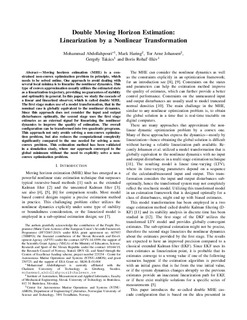Double Moving Horizon Estimation: Linearization by a Nonlinear Transformation
Chapter
Accepted version
Permanent lenke
http://hdl.handle.net/11250/2579290Utgivelsesdato
2018Metadata
Vis full innførselSamlinger
Originalversjon
10.23919/ECC.2018.8550273Sammendrag
Moving horizon estimation (MHE) is a con- strained non-convex optimization problem in principle, which needs to be solved online. One approach to avoid dealing with several local minima is to linearize the nonlinear dynamics. This type of convex approximation usually utilizes the estimated state as a linearization trajectory, providing no guarantees of stability and optimality in general. In this paper, we study the cascade of a linear and linearized observer, which is called double MHE. The first stage makes use of a model transformation, that in the nominal case is globally equivalent to the nonlinear dynamics. Since this approach does not consider the input and output disturbances optimally, the second stage uses the first stage estimates as an external signal for linearizing the nonlinear dynamics to improve the quality of estimation. The overall configuration can be transformed into two quadratic programs. This approach not only avoids solving a non-convex optimiza- tion problem, but also reduces the computational complexity significantly compared to the one needed for solving a non- convex problem. This estimation method has been validated in a simulation study, where our approach converged to the global minimum without the need to explicitly solve a non- convex optimization problem.
